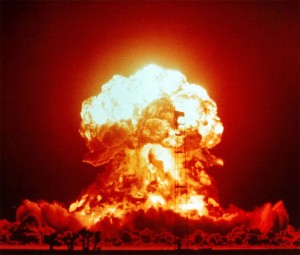
Robert F. Dodge, M.D.,
is a practicing family physician, writes for PeaceVoice, and serves on the boards of the Nuclear Age Peace Foundation, Beyond War, Physicians for Social Responsibility Los Angeles, and Citizens for Peaceful Resolutions.
The upcoming 70th anniversary of the U.S. nuclear destruction of Hiroshima and Nagasaki is a fitting moment for the world to contemplate the dangers from the continuation of nuclear arsenals and the cavalier attitude that many countries take toward geopolitical crises, as Robert Dodge explains.
This week the world remembers the events of 70 years ago in Japan, on Aug. 6 and 9, when the U.S. dropped the first atomic bombs on two cities – Hiroshima and Nagasaki. We are reminded that these bombs instantly killed more than 100,000 human beings and that in the days and weeks that followed, tens of thousands more died from injuries suffered during the bombing and from the effects of nuclear radiation afterward.
This year, on Aug. 6, the day the atomic bomb was dropped over Hiroshima, there will be worldwide vigils to remind humanity of the beginning events of our world’s nuclear history – tragedies of death and destruction.
To ensure these events are never repeated, we must educate those among us who are unaware or are uninformed about the real threats nuclear weapons pose. People need to know that in the seven decades that have followed the bombings of Hiroshima and Nagasaki, some of the world’s governments have done little to move away from the use of nuclear weapons. Inexplicably, many governments have even chosen to move closer to the brink of destroying civilization and the probability of causing the extinction of our species.
After witnessing the horrific reality caused by these weapons 70 years ago, mankind has always had two options. The first is to rid the planet of these weapons and the second is to build more. To the detriment of the world, governments like U.S. and Russia have consistently chosen the latter option.
The insane doctrine throughout the Cold War, appropriately called Mutually Assured Destruction (MAD), was based on guarantees of the annihilation of an adversary in retaliation for a first-strike. The MAD doctrine has resulted in an incorrect notion of nuclear war deterrence and has provided a false sense of security for most civilians who hope their governments are wise enough to not attack another nuclear power. The ill-advised faith in MAD has been the major driver of the arms race, which has so far encouraged governments to build another 15,685 nuclear weapons.
Following the bombings of Japan and subsequent nuclear testing by numerous governments, the world has proof of how destructive nuclear weapons really are. We have also recently learned that these weapons have the potential to be much more dangerous than most had ever imagined.
We now know that even a unilateral attack using the nuclear arsenals of either the U.S. or Russia, even without retaliation, would ultimately result in such catastrophic global climate change that billions would die from starvation and disease, including the people of the attacking nation. In effect, the MAD doctrine of the Cold War has become a doctrine of Self Assured Destruction which ultimately turns any nation that would unleash its nuclear arsenal into suicide bombers and the destroyers of their own civilization. SAD indeed.
Even a limited regional nuclear war using "only” 100 Hiroshima-size bombs, possibly between India and Pakistan, a vulnerable nuclear hot spot on the planet, would cause immense injury, death and destruction. It is estimated that a nuclear strike of this size would kill 20 million people outright and the after effects resulting from global climate change in the days that follow would be catastrophic, killing more than two billion people around the world. The effects of a regional nuclear war like this would continue for more than 10 years. Remarkably, this scenario uses less than half of one percent of the global arsenals.
On this 70th anniversary of the nuclear age, we have an opportunity and responsibility to act. Knowing what we now know, we can no longer make the choice to sit idly. Ultimately the longer we adhere to the MAD doctrine, the more probable that our luck will run out and we will experience nuclear war either by accident or intent.
Citizens of the world must demand that our governments work together with the majority of nations, now numbering 113, who have signed the "Humanitarian Pledge” to ban nuclear weapons by convention. Every other weapon of mass destruction has been banned and nuclear weapons need to be banned as well.
All attempts at nonproliferation and diplomacy must be supported including the nuclear deal with Iran. America’s citizens must demand that our nation join the non-nuclear nations of the world and work together to abolish these weapons. We owe this to the survivors of Hiroshima and Nagasaki bombings, to our children and to the future generations who deserve a nuclear weapon-free world.



_jpg/250px-ElbeDay1945_(NARA_ww2-121).jpg)





